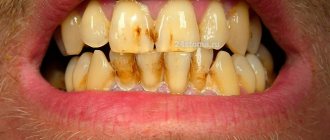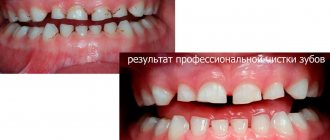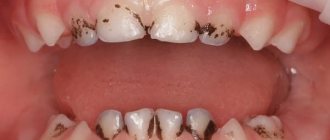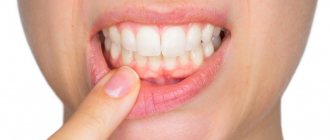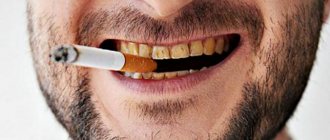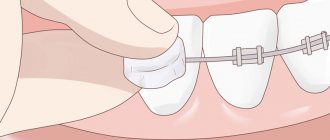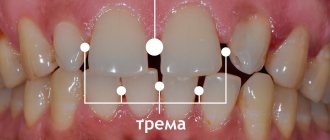Since childhood, we have all been told how important it is to eat right, that the vitamins and minerals entering our body are no less important than the food itself. These rules were especially remembered by those who, since childhood, did not like fish, cottage cheese, vegetables and other healthy foods. But our parents were right: our health greatly depends on what and in what quantities we eat. Even dental diseases very often arise precisely because of poor nutrition. What about tea, everyone’s favorite drink, so common in every home, in every family? Let's figure out what benefits it brings to our teeth, if, of course, we consume it without sugar.
Benefits of tea
Green hour has a very beneficial effect on the oral cavity: it improves blood circulation in the gums and also strengthens the teeth. Thanks to the beneficial microelements contained in tea (fluoride, iron, zinc, calcium), you can even avoid inflammation of the gums and tissues surrounding the tooth, and also slightly whiten your teeth. Naturally, tea cannot make it snow-white like after a teeth whitening procedure in Minsk
Scientists have proven that people who regularly drink green tea visit the dentist much less often. This, of course, does not mean that lovers of this drink do not suffer from oral diseases; it’s just that tea has a kind of preventive effect, since it is considered a good antibacterial agent against caries. Why not help on the farm? Saves us money on dental treatment under anesthesia or any other dental procedures that help maintain healthy teeth. And for those who suffer from halitosis, or, in other words, bad breath, green tea can easily replace chewing gum or mints. In general, solid advantages, and that’s all.
Green tea
In general, all types of tea are obtained from the leaves of one plant. The only difference is the degree of processing. To obtain green varieties, the leaves are subjected to weak fermentation or not fermented at all, so they retain most of the beneficial substances: antioxidants, organic acids, various vitamins and minerals.
Briefly about green tea: 1. Used in traditional Indian and Chinese medicine. 2. Contains antioxidants, vitamins and beneficial microelements. 3. Helps normalize weight. 4. Slows down aging and improves the condition of skin, nails and hair. 5. Not suitable for people with high blood pressure. 6. Used in the prevention of serious diseases, including cancer. 7. Contains caffeine and can cause insomnia. 8. Stimulates brain function more gently and safely than coffee. 9. Has a diuretic effect. 10. The recommended norm is no more than three cups per day.
The effect of green tea on the health of teeth and gums
Drinking green tea daily reduces the risk of developing tooth decay, gum disease, and even oral cancer. The main thing is to drink the drink without added sugar, otherwise some of the beneficial effects will disappear.
Numerous studies have shown that green tea:
Prevents the development of caries. The main cause of tooth decay is bacteria living in plaque. They digest sugars from food and as a result produce lactic acid, which destroys tooth enamel. Green tea's antioxidants (catechins) inhibit bacterial activity, thereby reducing acidity in the mouth. Fluorides have an additional anti-caries effect, protecting tooth enamel from destruction.
Strengthens gum health. Catechins block the growth of bacteria that cause gum inflammation. This helps prevent gingivitis and periodontitis. In patients with established periodontitis who drink green tea daily, the disease progresses more slowly than in those who do not drink it. And their gum pockets are not so deep.
Green tea neutralizes sulfur compounds. These are specific volatile substances that are released by microorganisms living in the mouth. In its “deodorizing” ability, green tea is superior to mint, chewing gum and parsley essential oil. Reduces the risk of oral cancer. Green tea catechins have been shown to inhibit the growth of tumor cells and prevent the development of oral squamous cell carcinoma. This is the most common type of head and neck cancer.
“And how much green tea should you drink?”
Recommended dose: 3-4 cups per day. You should drink tea only when it is freshly brewed - in air, catechins gradually oxidize and the drink loses its beneficial properties. The brewing temperature should not exceed 85°C. Ratio of dry leaves to water: 3 g per 150 ml. Drinking more than 4 cups a day is not recommended, since green tea, like black tea, contains caffeine, which excites the nervous system and can cause insomnia.
https://zen.yandex.ru/media/roott/govoriat-zelenyi-chai-polezen-dlia-zubov-eto-pravda-5e6e60c658c7246c0e428f13 https://chaepedia.com/zelenii_chai/63-lechenie-zelenym-chaem.html https://style.rbc.ru/health/5f398a5b9a79477681abc25b https://www.ayzdorov.ru/tvtravnik_zelennii_chaii.php
Harmful effects
As for the harm, here we will have to talk specifically about black tea. Just like coffee, it contains caffeine, which can stain tooth enamel. But, at the same time, black tea, like green tea, fights oral bacteria. The main thing to remember is that you need to brew tea and, if possible, avoid tea bags, since they do not provide any benefit to your teeth. Let us also remember about herbal teas: many dentists warn that this type of tea, if consumed in large quantities, can contribute to the destruction of enamel. In this case, fluoridation or dental implantation in Minsk will be simply necessary. But this is an additional waste of money that could have been avoided if you followed the doctors’ recommendations.
products beneficial for tooth enamel:
Hard cheeses
According to the results of the study, hard varieties of cheese contribute to the mechanical cleansing of the tooth surface, and in addition contain a large amount of calcium and phosphates that are beneficial for tooth enamel.
Celery
Celery is good for teeth, English scientists from the John Radcliffe Hospital in Oxford have proven. According to them, celery requires thorough chewing, which allows you to remove plaque and bacteria from the most inaccessible places. In addition, during this time, chewing produces a considerable amount of saliva, which has a bactericidal effect.
Green tea
The substances contained in green tea, catechins, are deadly to bacteria, which are commonly called carious monsters. And what prevents the development of caries is good for tooth enamel.
Onion
This vegetable is rich in phytoncides - natural bacteria destroyers. The unpleasant smell is not so bad; you can get rid of it by chewing a sprig of parsley or a menthol tablet.
conclusions
No matter what benefits or harm various types of tea may have, you should not deny yourself a mug of your favorite drink, however, just as you should not drink it in large quantities. Everything should be in moderation and on time. Don’t forget about regular visits to the dentist, as well as the rules of oral hygiene, because healthy and harmful foods are only part of what contributes to dental diseases; the rest depends on us. Take care of your teeth now, and then your smile will be beautiful and healthy for many years.
What foods and drinks should you limit to keep your teeth healthy?
It is worth minimizing the consumption of certain types of food. These include, first of all, sweets, primarily non-natural (produced by the confectionery industry), soft ones that do not require chewing effort, as well as sticky and stringy ones. Sugar present in the oral cavity accelerates the proliferation of pathogenic bacteria. Many sweets stick to teeth, which contributes to tooth decay. Sugar-containing carbonated drinks and chewing gum are especially harmful to the oral cavity.
A large amount of red meat, fatty and fried foods contribute to the intensive proliferation of pathogenic bacteria in the oral cavity. Foods rich in acids that corrode tooth enamel should be eaten with caution. These include some citrus fruits, fruits, juices, marinades, and some canned foods.
You should consume less drinks and foods with a lot of caffeine, which removes calcium from the body. If you are used to eating a lot of chocolate, drinking strong tea or coffee (they, by the way, darken tooth enamel), then you should consume more foods high in calcium.
Causes of yellowing teeth
As you know, our tooth is protected by a special shell – enamel. The enamel tends to deplete over time, and then the internal substance of the tooth begins to appear, which in dental science is designated by the term “dentin”. Dentin, like enamel, is very sensitive to the effects of liquids, food and the environment in general.
Teeth react very sharply to sweet foods. There are bacteria in the mouth that digest sugar. Such bacteria produce acid, which spoils the enamel and eats it away. The consequence of this is the formation of tiny micropores in which the remains of food and liquids we consume are retained. Therefore, uncontrolled consumption of sugar and sweet foods must be limited.
Very common causes of yellowing of tooth enamel are smoking and drinking alcoholic beverages. Tobacco smoke, which contains many toxins, not only destroys the top layer of the tooth, leaving a yellow plaque, but also increases the risk of developing other inflammations and complications in the oral cavity.
The next factor is improper chewing of food, when one side of the jaw, right or left, is involved in the eating process. This causes substances that destroy enamel to accumulate only on certain teeth.
There are also lesser known causes of yellowing of the enamel, but they also have a significant impact on the condition of teeth. For example, it is very harmful to drink non-distilled water. Untreated water can contain a lot of rough substances and metals. In addition to the fact that it is difficult for the body itself, it injures the enamel.
Try to eat as many foods as possible that are not brightly colored. Frequent consumption of brightly colored foods can indirectly affect the discoloration of tooth enamel. This is not a plaque yet, but already a stain that requires measures to get rid of it. To remove pigments that color the enamel, it is enough to use a mouth rinse in time, that is, immediately after eating. It washes away dyes, preventing them from penetrating the micropores of enamel or dentin.
As you know, rapid yellowing of teeth can be caused by frequent consumption of tea (especially green varieties) and coffee. But what if you are an avid coffee drinker and drink several cups of this invigorating drink a day? The solution is still the same - use mouthwash and do not forget to brush your teeth properly in the morning and before bed.
Yellowing of tooth enamel may be a consequence of the composition of the salivary fluid. Saliva helps to naturally clean teeth; its natural function is to remove dirt from the enamel. If the harmonious composition of the salivary fluid is disrupted, the tooth enamel begins to quickly turn yellow. The composition of saliva can change due to general ailments of the body - influenza, colds, ARVI. If a person is sick, his saliva becomes more viscous and can no longer clean the surface of the tooth.
Finally, it is necessary to highlight a number of special cases in which yellowing of the enamel is observed. These cases are related to the characteristics of human health.
- Changes in tooth color due to taking certain medications. Such drugs include, for example, tetracycline.
- Too much fluoride enters the body, most often through drinking water.
- The human body has problems with the gallbladder or liver (another sign of these diseases is staining of the tongue).
- Hereditary factor (yellowing of the enamel during the formation of dental tissues).
- General age-related changes in the body.
To begin with, it is worth noting that, as with any disease, it is necessary to take preventive measures to prevent its development. What to do in case of yellowing teeth:
- eat neutral-colored food and purified water; regularly brush your teeth correctly in the morning and evening;
- use mouth rinses after meals, especially after drinking tea, coffee, wine;
- get rid of smoking.
The article material was approved by the doctor: Feshchenko (Kashirova) Evgenia Aleksandrovna Dentist-therapist
16 years
Harm
Researchers around the world have conducted experiments to identify the negative aspects of green tea and its effect on teeth and gums . Scientists have concluded that any amount of drink consumed will not cause any harm to the oral cavity.
However, this conclusion does not apply to black tea.
Studies have found that the use of this variety leads to the rapid formation of a dark film on the surface of the tooth .
Regular consumption of the drink leads to darkening of tooth enamel, however, this can be avoided if you rinse your mouth with a special solution after each tea .
The beneficial properties of the drink directly depend on the quality of the product . Cheap tea bags are characterized by a high content of fluoride compounds. Their daily intake should not exceed 4 grams, since excess can harm teeth, bones and muscles.
Useful video
From this video you will learn how long after you can eat and drink after tooth extraction:
Tea is considered the safest drink for teeth, since only its excessive consumption can lead to negative consequences in the form of discoloration of tooth enamel.
When purchasing a product, it is recommended to take into account its composition and duration of storage , since flavors and fruits in the composition have a different effect on the teeth, and the storage time of the product contributes to the accumulation of fluoride compounds in tea leaves.
Common questions about the properties of tea drinks
Is it possible to drink tea after tooth extraction?
Attention! Dentists do not recommend eating or drinking for 2 to 3 hours after tooth extraction due to the healing of the socket.
After this time, it is recommended to drink only cold drinks, since hot liquid can cause bleeding from the socket of an extracted tooth .
Does green tea protect your teeth?
Japanese dentists have found that this drink helps strengthen enamel and protect gums thanks to a large amount of fluoride and cahetin.
The components of the drink have anti-inflammatory and bactericidal properties , which prevents premature tooth loss.
Does green tea stain teeth?
Cosmetic dentists believe that excessive consumption of green tea can change the natural color of the enamel and turn it yellowish .
Important! The fact that teeth turn yellow is due to the high content of tannins, which enhance the coloring properties of the components.
To maintain a white smile, it is not recommended to drink the drink in excessive quantities.
Tea after filling
Depending on the filling technology and the composition of the material used, the filling can harden within several hours after the procedure or harden under the light of a special lamp immediately after installation. The danger of drinking tea after filling is the risk of staining the filling yellow or brown .
An amalgam filling
should not be exposed to dyes for 1–2 days , since during this time it undergoes a polymerization process.
Lamp treatment is typical for ceramic fillings.
This technology allows you to achieve the desired filling result without waiting and consume liquids and food almost immediately after the procedure.
Note! You should not drink hot drinks, as the new filling may become damaged and begin to crack under the influence of temperature.
Can tea whiten teeth?
Whitening properties are characteristic only of green and white teas , since, along with fluorine content, they contain practically no coloring molecules.
Tea after whitening
Dentists recommend abstaining from food and drinks for two hours after completing the whitening procedure.
After this period, the patient must go on a “White Diet” for up to two weeks.
The principle of the diet is to consume white foods or those that do not contain dyes in their composition.
At this time, only green and white teas are allowed to be consumed in small quantities.
Tea during teething
Teething is always accompanied by an inflammatory process. The antibacterial and anti-inflammatory properties of tea can facilitate the teething process and protect the child from oral infections .
What should you eat to keep your teeth as healthy as possible?
Give preference to raw vegetables and hard fruits such as carrots, cabbage, radishes, apples, and bell peppers. They train your gums and cleanse your teeth of plaque.
For dental and oral health in general, all foods that contain significant amounts of calcium, fluorine, zinc, iron, magnesium, phosphorus, vitamins A, K, D, B6, B9, B12, E and C, protein, arginine, casein and phosphates, Omega-3 polyunsaturated fatty acids, antioxidants. It is advisable to regularly consume greens (for example, dill, celery, parsley, cilantro), leafy vegetables (lettuce, spinach and others), nuts, seeds, whole grains, chicken eggs, garlic, ginger, cheese, cottage cheese, yogurt, white meat , lean beef, fish, shrimp, legumes (soybeans, lentils, beans), mushrooms, buckwheat, oats, raisins, wholemeal and bran bread.
You can moderately consume natural sweets, for example, honey (it is better to eat it with honeycombs, chewing which improves the condition of teeth and gums). You should also eat dried fruits. They are rich in vitamins, contain natural (unrefined) saccharides, and chewing them is good for your teeth. Fresh berries and fruits that are good for teeth include rose hips, strawberries, grapes, cherries, currants, peaches, plums, and pineapples. Unsweetened green tea, especially consumed after meals, is also beneficial for the oral cavity, as it contains polyphenols and fluorides, destroys many pathogens, inhibits the growth of bacteria, neutralizes acid, prevents tooth loss and reduces gum inflammation.
Plant products containing anthocyanins (for example, cranberries, blueberries, raspberries, red cabbage, eggplant, black rice) prevent the appearance and development of pathogens on teeth. Fermented milk products, due to the content of probiotics in them, prevent the proliferation of pathogens in the oral cavity.
We can conclude: maintaining dental health by eating right is not difficult. Unfortunately, many people from childhood ate the wrong things and the wrong things, which caused various dental problems. If your teeth are significantly damaged, partially or completely lost, prosthetics made using one of the advanced techniques will return you to the ability to eat without difficulty or inconvenience.
